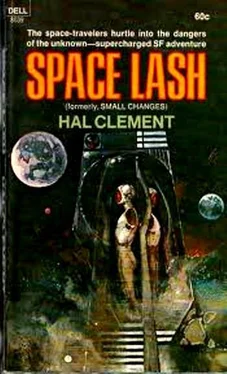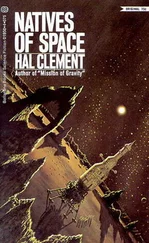Hal Clement - Space Lash
Здесь есть возможность читать онлайн «Hal Clement - Space Lash» весь текст электронной книги совершенно бесплатно (целиком полную версию без сокращений). В некоторых случаях можно слушать аудио, скачать через торрент в формате fb2 и присутствует краткое содержание. Год выпуска: 1969, Жанр: Фантастика и фэнтези, на английском языке. Описание произведения, (предисловие) а так же отзывы посетителей доступны на портале библиотеки ЛибКат.
- Название:Space Lash
- Автор:
- Жанр:
- Год:1969
- ISBN:нет данных
- Рейтинг книги:3 / 5. Голосов: 1
-
Избранное:Добавить в избранное
- Отзывы:
-
Ваша оценка:
- 60
- 1
- 2
- 3
- 4
- 5
Space Lash: краткое содержание, описание и аннотация
Предлагаем к чтению аннотацию, описание, краткое содержание или предисловие (зависит от того, что написал сам автор книги «Space Lash»). Если вы не нашли необходимую информацию о книге — напишите в комментариях, мы постараемся отыскать её.
Space Lash — читать онлайн бесплатно полную книгу (весь текст) целиком
Ниже представлен текст книги, разбитый по страницам. Система сохранения места последней прочитанной страницы, позволяет с удобством читать онлайн бесплатно книгу «Space Lash», без необходимости каждый раз заново искать на чём Вы остановились. Поставьте закладку, и сможете в любой момент перейти на страницу, на которой закончили чтение.
Интервал:
Закладка:
Hal Clement
Space Lash

CONTENTS
Dust Rag
Sun Spot
Uncommon Sense
“Trojan Fall”
Fireproof
Halo
The Foundling Stars
Raindrop
The Mechanic
Published by DELL PUBLISHING CO., INC. 750 Third Avenue, New York, N.Y. 10017
Previously printed as Small Changes
1969 by Doubleday & Company, Inc. 1969
Dust Rag
“CHECKING OUT.”
“Checked, Ridge. See you soon.”
Ridging glanced over his shoulder at Beacon Peak, as the point where the relay station had been mounted was known. The gleaming dome of its leaden meteor shield was visible as a spark; most of the lower peaks of Harpalus were already below the horizon, and with them the last territory with which Ridging or Shandara could claim familiarity. The humming turbine tractor that carried them was the only sign of humanity except each others' faces — the thin crescent of their home world was too close to the sun to be seen easily, and Earth doesn't look very “human” from outside in any case.
The prospect ahead was not exactly strange, of course. Shandara had remarked several times in the last four weeks that a man who had seen any of the Moon had seen all of it. A good many others had agreed with him. Even Ridging, whose temperament kept him normally expecting something new to happen, was beginning to get a trifle bored with the place. It wasn't even dangerous; he knew perfectly well what exposure to vacuum would mean, but checking spacesuit and airlock valves had become a matter of habit long before.
Cosmic rays went through plastic suits and living bodies like glass, for the most part ineffective because unabsorbed; meteors blew microscopic holes through thin metal, but scarcely marked spacesuits or hulls, as far as current experiences went; the “dust-hidden crevasses” which they had expected to catch unwary men or vehicles simply didn't exist — the dust was too dry to cover any sort of hole, except by filling it completely. The closest approach to a casualty suffered so far had occurred when a man had missed his footing on the ladder outside the Albireo's airlock and narrowly avoided a hundred-and-fifty-foot fall.
Still, Shandara was being cautious. His eyes swept the ground ahead of their tracks, and his gauntleted hands rested lightly on brake and steering controls as the tractor glided ahead.
Harpalus and the relay station were out of sight now. Another glance behind assured Ridging of that. For the first time in weeks he was out of touch with the rest of the group, and for the first time he wondered whether it was such a good idea. Orders had been strict, the radius of exploration settled on long before was not to be exceeded. Ridging had been completely in favor of this; but it was his own instruments which had triggered the change of schedule.
One question about the Moon to which no one could more than guess an answer in advance was that of its magnetic field. Once the group was on the surface it had immediately become evident that there was one, and comparative readings had indicated that the south magnetic pole — or a south magnetic pole — lay a few hundred miles away. It had been decided to modify the program to check the region, since the last forlorn chance of finding any trace of a gaseous envelope around the Moon seemed to lie in auroral investigation. Ridging found himself, to his intense astonishment, wondering why he had volunteered for the trip and then wondering how such thoughts could cross his mind. He had never considered himself a coward, and certainly had no one but himself to blame for being in the tractor. No one had made him volunteer, and any technician could have set up and operated the equipment.
“Come out of it, Ridge. Anyone would think you were worried.” Shandara's careless tones cut into his thoughts. “How about running this buggy for a while? I've had her for a hundred kilos.”
“Right.” Ridging slipped into the driver's seat as his companion left it without slowing the tractor. He did not need to find their location on the photographic map clipped beside the panel; he had been keeping a running check almost unconsciously between the features it showed and the landmarks appearing over the horizon. A course had been marked on it, and navigation was not expected to be a problem even without a magnetic compass.
The course was far from straight, though it led over what passed for fairly smooth territory on the Moon. Even back on Sinus Roris the tractor had had to weave its way around numerous obstacles; now well onto the Mare Frigoris, the situation was no better, and according to the map it was nearly time to turn south through the mountains, which would be infinitely worse. According to the photos taken during the original landing approach the journey would be possible, however, and would lead through the range at its narrowest part out onto Mare Imbrium. From that point to the vicinity of Plato, where the region to be investigated lay, there should be no trouble at all.
Oddly enough, there wasn't. Ridging was moderately surprised; Shandara seemed to take it as a matter of course. The cartographer had eaten, slept, and taken his turn at driving with only an occasional remark. Ridging was beginning to believe by the time they reached their goal that his companion was actually as bored with the Moon as he claimed to be. The thought, however, was fleeting; there was work to be done.
About six hundred pounds of assorted instruments were attached to the trailer which had been improvised from discarded fuel tanks. The tractor itself could not carry them; its entire cargo space was occupied by another improvisation — an auxiliary fuel tank which had been needed to make the present journey possible. The instruments had to be removed, set up in various spots, and permitted to make their records for the next thirty hours. This would have been a minor task, and possibly even justified a little boredom, had it not been for the fact that some of the “spots” were supposed to be as high as possible. Both men had climbed Lunar mountains in the last four weeks, and neither was worried about the task; but there was some question as to which mountain would best suit their needs.
They had stopped on fairly level ground south and somewhat west of Plato—“sunset” west, that is, not astronomical. There were a number of fairly prominent elevations in sight. None seemed more than a thousand meters or so in height, however, and the men knew that Plato in one direction and the Teneriffe Mountains in the other had peaks fully twice as high. The problem was which to choose.
“We can't take the tractor either way,” pointed out Shandara. “We're cutting things pretty fine on the fuel question as it is. We are going to have to pack the instruments ourselves, and it's fifty or sixty kilometers to Teneriffe before we even start climbing. Plato's a lot closer.”
“The near side of Plato's a lot closer,” admitted Ridging, “but the measured peaks in its rim must be on the east and west sides, where they can cast shadows across the crater floor. We might have to go as far for a really good peak as we would if we headed south.”
“That's not quite right. Look at the map. The near rim of the crater is fairly straight, and doesn't run straight east and west; it must cast shadows that they could measure from Earth. Why can't it contain some of those two-thousand-meter humps mentioned in the atlas?”
“No reason why it can't; but we don't know that it does. This map doesn't show.”
Читать дальшеИнтервал:
Закладка:
Похожие книги на «Space Lash»
Представляем Вашему вниманию похожие книги на «Space Lash» списком для выбора. Мы отобрали схожую по названию и смыслу литературу в надежде предоставить читателям больше вариантов отыскать новые, интересные, ещё непрочитанные произведения.
Обсуждение, отзывы о книге «Space Lash» и просто собственные мнения читателей. Оставьте ваши комментарии, напишите, что Вы думаете о произведении, его смысле или главных героях. Укажите что конкретно понравилось, а что нет, и почему Вы так считаете.












